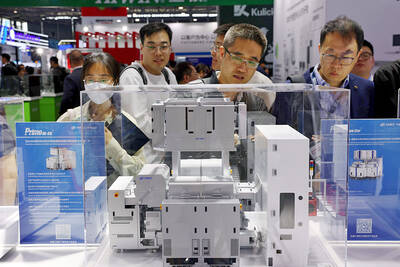Chinese manufacturers are driving growth in the smartphone market as sector leaders Samsung Electronics Co and Apple Inc sputter, a survey showed on Thursday.
The survey by Gartner Inc showed that in the third quarter, three Chinese vendors — Huawei Technologies Co (華為), Oppo Mobile Telecommunications Corp (歐珀移動) and BBK Communication Equipment Corp Ltd (步步高) — together accounted for 21 percent of the smartphones sold worldwide, and were the only vendors in the top five to increase sales.
“Sales of smartphones in China grew by 12.4 percent and the vendors who most successfully exploited the sales opportunities there were Oppo and BBK,” Gartner analyst Anshul Gupta said. “In Oppo’s case, 81 percent of its smartphone sales came from China, while BBK accounted for 89 percent of smartphone sales in China. These two vendors also grew strongly in India, Indonesia, Malaysia, Thailand and Russia.”
Gartner’s survey confirmed other reports showing Samsung Electronics Co and Apple Inc at the top of the global market, but with slipping sales.
The research firm said Samsung’s market share dropped to 19.2 percent amid the fiasco over its Galaxy Note 7 smartphones, which were recalled and then halted after overheating batteries led to fires.
“The decision to withdraw the Galaxy Note 7 was correct, but the damage to Samsung’s brand will make it harder for the company to increase its smartphone sales in the short term,” Gupta said. “For Samsung, it’s crucial that the Galaxy S8 launches successfully, so that partners and customers regain trust in its brand.”
Apple’s share dropped to 11.5 percent as the iPhone maker failed to get much benefit from Samsung’s woes, Gartner said.
“The withdrawal of Samsung’s Galaxy Note 7 may benefit sales of Apple’s iPhone 7 Plus only slightly, as Note 7 users are likely to stay with Samsung or at least with Android,” Gartner analyst Roberta Cozza said. “To some extent, other Android vendors could capitalize on this situation in the short term — for example, Huawei and other Chinese brands present in the premium Android phone segment.”
Cozza said the Samsung problems could also benefit Google, which recently introduced its Pixel and Pixel XL devices.
Gartner said overall smartphone sales in the quarter rose 5.4 percent to 373 million units.

SEMICONDUCTOR SERVICES: A company executive said that Taiwanese firms must think about how to participate in global supply chains and lift their competitiveness Taiwan Semiconductor Manufacturing Co (TSMC, 台積電) yesterday said it expects to launch its first multifunctional service center in Pingtung County in the middle of 2027, in a bid to foster a resilient high-tech facility construction ecosystem. TSMC broached the idea of creating a center two or three years ago when it started building new manufacturing capacity in the US and Japan, the company said. The center, dubbed an “ecosystem park,” would assist local manufacturing facility construction partners to upgrade their capabilities and secure more deals from other global chipmakers such as Intel Corp, Micron Technology Inc and Infineon Technologies AG, TSMC said. It

EXPORT GROWTH: The AI boom has shortened chip cycles to just one year, putting pressure on chipmakers to accelerate development and expand packaging capacity Developing a localized supply chain for advanced packaging equipment is critical for keeping pace with customers’ increasingly shrinking time-to-market cycles for new artificial intelligence (AI) chips, Taiwan Semiconductor Manufacturing Co (TSMC, 台積電) said yesterday. Spurred on by the AI revolution, customers are accelerating product upgrades to nearly every year, compared with the two to three-year development cadence in the past, TSMC vice president of advanced packaging technology and service Jun He (何軍) said at a 3D IC Global Summit organized by SEMI in Taipei. These shortened cycles put heavy pressure on chipmakers, as the entire process — from chip design to mass

Germany is to establish its first-ever national pavilion at Semicon Taiwan, which starts tomorrow in Taipei, as the country looks to raise its profile and deepen semiconductor ties with Taiwan as global chip demand accelerates. Martin Mayer, a semiconductor investment expert at Germany Trade & Invest (GTAI), Germany’s international economic promotion agency, said before leaving for Taiwan that the nation is a crucial partner in developing Germany’s semiconductor ecosystem. Germany’s debut at the international semiconductor exhibition in Taipei aims to “show presence” and signal its commitment to semiconductors, while building trust with Taiwanese companies, government and industry associations, he said. “The best outcome

Semiconductor equipment billings in Taiwan are expected to double this year, as manufacturers in the industry are keen to expand production to meet strong global demand for artificial intelligence applications, according to SEMI, which represents companies in the electronics manufacturing and design supply chain. Speaking at a news conference before the opening of Semicon Taiwan trade show tomorrow, SEMI director of industry research and statistics Clark Tseng (曾瑞榆) said semiconductor equipment billings in Taiwan are expected to grow by an annual 100 percent this year, beating an earlier estimate of 70 percent growth. He said that Taiwan received a boost from a